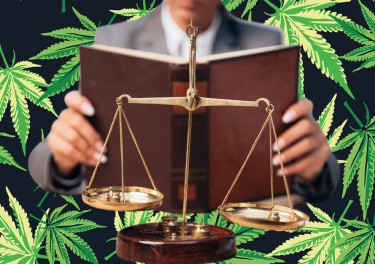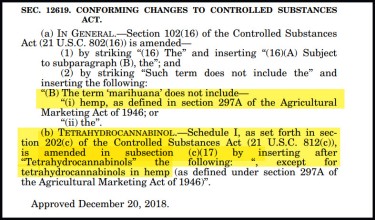
The Drug Enforcement Administration (DEA) recently explained that the cannabinoid THCA must be included when calculating THC levels to meet the legal definition of hemp, according to the 2018 Farm Bill. In a letter dated May 13, Terrence Boos, the head of the DEA’s drug and chemical evaluation section, clarified that THCA, which turns into delta-9 THC when heated, must be included in THC concentration calculations. This clarification has caused concerns in the hemp industry, which worries about new compliance challenges.
In his letter, Boos detailed that the legal limit of 0.3% delta-9 THC applies not only to delta-9 THC itself but also to THCA after it is heated and converted. This means that cannabis-derived THCA cannot be considered hemp under the Controlled Substances Act (CSA). This clarification was reported by Marijuana Moment.
The DEA’s response came after cannabis lawyer Shane Pennington asked for more information regarding the issue. This decision comes at a time when Congress is reviewing regulations of cannabinoids in the Farm Bill.
Industry Concerns and Reactions
The new interpretation has caused anxiety among hemp industry producers due to the difficulties they may encounter in meeting legal THC requirements, as they will now have to also consider THCA content. This could mean more testing and potential legal issues related to the use of hemp and its products in the future.
While Congress is in the process of discussing improvements to the Farm Bill, the industry is paying attention to the potential changes in the regulation of these practices and how it could impact their activities.
Industry groups, such as the U.S. Hemp Roundtable, have strongly opposed this new interpretation. Jonathan Miller, the group’s general counsel, warned that it could destroy the hemp industry. He explained that most hemp farmers would fail to meet these new guidelines. Miller urged supporters to ask lawmakers to reject the amendment.
Shawn Hauser, co-chair of Vicente LLP’s hemp and cannabinoids practice, also weighed in. She noted that the Farm Bill requires THC testing before harvest, including THCA. Hauser explained that a plant with high THCA likely exceeds the legal THC limit, making it unlawful. This new interpretation has created confusion for businesses and state regulators.
These concerns highlight the potential impact of the DEA’s clarification. If the amendment passes, many hemp farmers might struggle to comply, leading to significant changes in the industry. Industry stakeholders are closely watching the situation and urging legislative action to prevent the amendment from being approved.
Congress Debates The Prohibition of Hemp-Derived Cannabinoids
The DEA’s letter about THCA comes at a time when federal lawmakers are rethinking hemp and cannabinoid regulations under a new version of the Farm Bill. Recently, a key House committee approved an amendment that would ban most hemp-derived cannabinoids, including delta-8 THC. This amendment, introduced by Rep. Mary Miller (R), suggests that cannabinoids made or processed outside the plant would no longer qualify as legal hemp.
Some groups, like the U.S. Cannabis Council (USCC), support tougher rules on intoxicating hemp products. The USCC, which includes major companies like Curaleaf Holdings, Canopy Growth, Cresco Labs, MariMed, Acreage Holdings, Verano Holdings, Dutchie, and Pax Labs, argues for uniform safety standards to protect consumers.
However, other industry voices express concern that these strict measures might unintentionally make non-intoxicating CBD products illegal. Many of these products contain small amounts of THC, which could fall afoul of the new regulations. This concern is highlighted by Marijuana Moment, emphasizing the potential risk to the broader hemp industry.
As lawmakers debate these changes, the industry is watching closely. The outcome could significantly affect hemp farmers, businesses, and the availability of CBD products. Industry stakeholders are urging careful consideration to avoid unintended consequences that could harm the sector.
Curaleaf’s Stance On The Amendment of Miller’s Farm Bill
Meanwhile, Curaleaf Holdings, the largest cannabis company in the U.S., has recently entered the market for hemp-derived THC products and voiced its concerns about proposed legislative changes. Boris Jordan, the executive chairman of Curaleaf, spoke out against the Miller amendment to the Farm Bill, which seeks to limit hemp-derived cannabinoids like delta-8 THC.
Jordan stated, “We disagree with the amendment introduced by Mary Miller (R-IL), which attempts to reverse the progress made by the Farm Bill. We support hemp farmers and believe that products made from hemp within the Farm Bill’s guidelines should be available to adults, with strict age restrictions and safety standards.
There should be a single regulatory framework for all cannabinoids, ensuring that all legal players in the hemp-derived product market follow the same safety and age restrictions. This is essential to combat the dangers posed by the illicit market, just as we do in the cannabis industry.”
Curaleaf’s position emphasizes the need for consistent regulations to support the legal market and protect consumers. The company argues that fair and uniform standards are necessary to ensure safety and to help legitimate businesses thrive while preventing illegal activities. The debate over these regulations is critical for the future of the hemp industry and its ability to innovate and provide safe products to consumers.
Conclusion
The debate over hemp-derived cannabinoids, including THCA and delta-8 THC, highlights significant concerns within the industry. The DEA’s clarification and the proposed Miller amendment to the Farm Bill have sparked fears of stricter regulations that could impact hemp farmers and businesses. Curaleaf Holdings, a major player in the cannabis market, strongly opposes these changes, advocating for consistent regulations that support both safety and innovation.
Boris Jordan, Curaleaf’s executive chairman, argues for a single regulatory framework for all cannabinoids, emphasizing the need for strict age restrictions and safety standards to protect consumers and combat the illicit market. This unified approach aims to create a fair playing field for legal businesses while ensuring product safety.
As lawmakers reconsider hemp regulations, the outcome will be crucial for the industry’s future. Ensuring balanced and consistent regulations is key to supporting the legal market, protecting consumers, and fostering innovation within the hemp and cannabis sectors.
FARM BILL LOOPHOLES GALORE, READ ON…
0.3% BY NET WEIGHT, THE GREATEST LOOPHOLE IS DRUG LAW HISTORY?
- SEO Powered Content & PR Distribution. Get Amplified Today.
- PlatoData.Network Vertical Generative Ai. Empower Yourself. Access Here.
- PlatoAiStream. Web3 Intelligence. Knowledge Amplified. Access Here.
- PlatoESG. Carbon, CleanTech, Energy, Environment, Solar, Waste Management. Access Here.
- PlatoHealth. Biotech and Clinical Trials Intelligence. Access Here.
- Source: http://cannabis.net/blog/news/to-thca-or-not-to-thca-that-is-the-question-dea-says-thca-is-not-legal-under-the-farm-bill-mari




